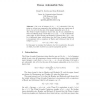Free Online Productivity Tools
i2Speak
i2Symbol
i2OCR
iTex2Img
iWeb2Print
iWeb2Shot
i2Type
iPdf2Split
iPdf2Merge
i2Bopomofo
i2Arabic
i2Style
i2Image
i2PDF
iLatex2Rtf
Sci2ools
107
Voted
ANTS
1998
Springer
1998
Springer
Dense Admissible Sets
Call a set of integers {b1, b2, . . . , bk} admissible if for any prime p, at least one congruence class modulo p does not contain any of the bi. Let (x) be the size of the largest admissible set in [1, x]. The Prime k-tuples Conjecture states that any for any admissible set, there are infinitely many n such that n+b1, n+b2, . . . n+bk are simultaneously prime. In 1974, Hensley and Richards [3] showed that (x) > (x) for x sufficiently large, which shows that the Prime k-tuples Conjecture is inconsistent with a conjecture of Hardy and Littlewood that for all integers x, y 2, (x + y) (x) + (y). In this paper we examine the behavior of (x), in particular, the point at which (x) first exceeds (x), and its asymptotic growth.
Related Content
| Added | 05 Aug 2010 |
| Updated | 05 Aug 2010 |
| Type | Conference |
| Year | 1998 |
| Where | ANTS |
| Authors | Daniel M. Gordon, Eugene R. Rodemich |
Comments (0)

